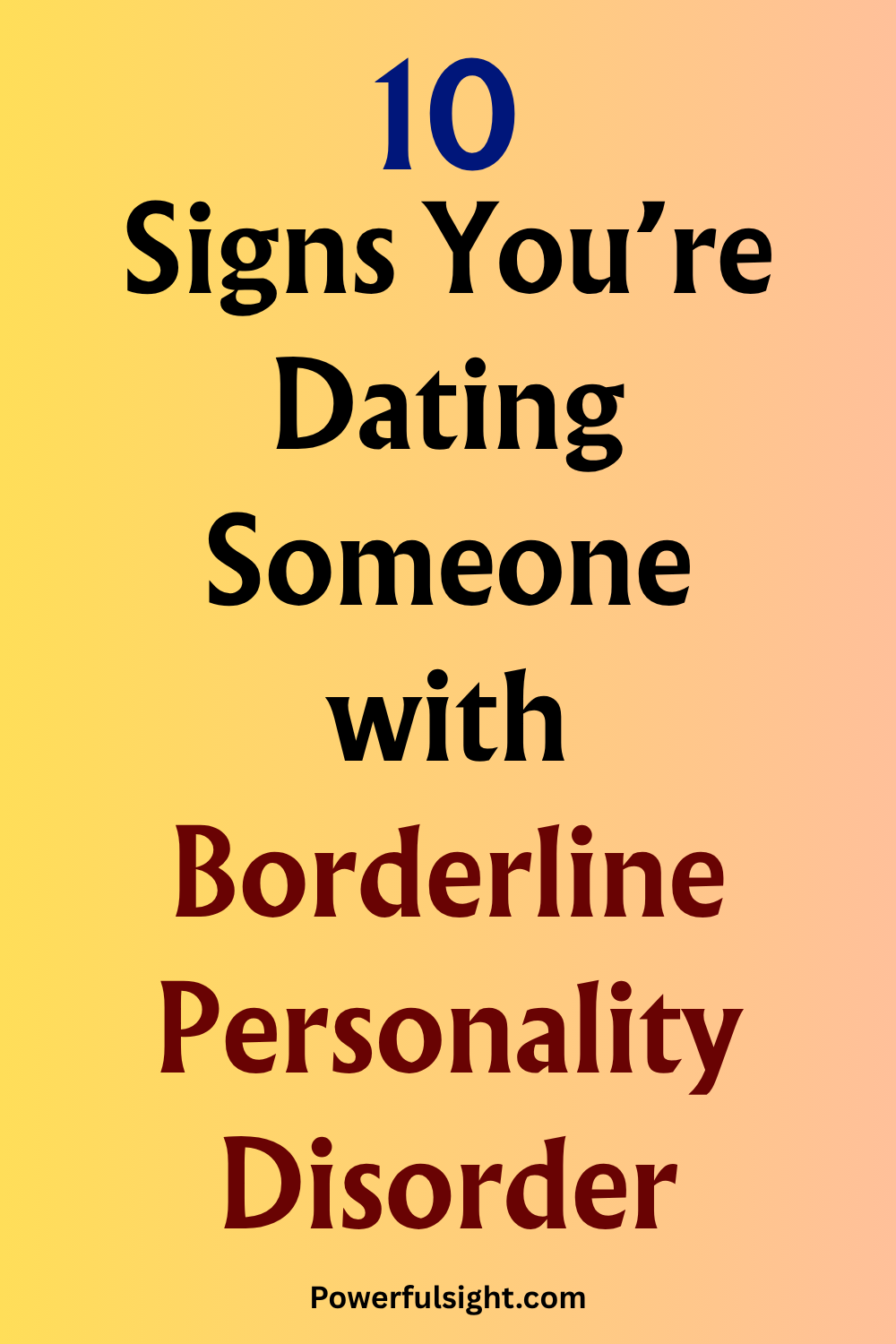Relationships are complex even when both people are emotionally well-adjusted. But when you start dating someone with Borderline Personality Disorder (BPD), the emotional highs and lows can be intense, confusing, and deeply painful.
BPD is a complex mental health condition characterized by unstable moods, an inconsistent sense of self, and difficulty maintaining relationships. People who live with BPD feel emotions very intensely, and their behavior—especially when triggered by fear of rejection or abandonment—can be extreme.
If you’ve ever felt like you’re walking on eggshells in your relationship or trapped in a cycle of highs and lows, understanding what to look for can help. Below are ten signs you might be dating someone with BPD.

10 Signs You’re Dating Someone with Borderline Personality Disorder
1. Emotional Highs and Lows Are the New Normal
It’s normal for relationships to have ups and downs, but when you’re dating someone with BPD, the intensity can be all-consuming. At first, everything may seem like a dream come true. They might adore you, praise you, and make you feel like the most special person in the world. This is called idealization, a common pattern in relationships involving people with BPD.
But soon—sometimes overnight—the tone of the relationship changes. Your partner might suddenly yell at you, mock you, or withdraw emotionally. The same person who told you how wonderful you are might now claim you never love them enough.
It’s not that they’re playing a manipulative game; their emotions are simply volatile. They can move from affection to fear to anger within minutes. For their partner, this can be exhausting and disorienting.
Related: Why Am I Obsessed With My Daughter’s Relationship?
2. Fear of Abandonment Rules the Relationship
Fear of abandonment is one of the most prominent features of BPD, and it often reveals itself gradually. It might begin innocently—with your partner needing constant reassurance or becoming anxious if you don’t respond to a text quickly.
As time goes on, these fears can grow stronger. They might accuse you of not loving them, become upset at small changes in routine, or interpret minor events as proof you’re pulling away. Even when there’s no real threat, they may leave preemptively to avoid being “abandoned.”
Their emotional world often feels dangerous and unstable. Even a hint of rejection—real or imagined—can trigger panic. They might alternate between clinging to you desperately and pushing you away to protect themselves from pain.
Related: How To Survive A Sexless Relationship
3. They Struggle with Identity and Self-Image
People with BPD often have an unstable sense of who they are. Their identity can shift depending on their mood, situation, or the people they’re with.
You may notice frequent changes in their goals, self-image, or even personality. They might dive into a new job, hobby, or project, only to abandon it weeks later as they search for a sense of direction.
In relationships, this instability can lead to mirroring—adopting your tastes, values, or opinions. At first, it may seem like deep compatibility, but later they might resent or reject those same traits once they begin to feel trapped or uncertain of themselves.
Related: Why Do People Cheat in Relationships?
4. You Find Yourself Constantly Walking on Eggshells
When someone’s emotions are unpredictable, you start adjusting your behavior to avoid conflict. You learn their “hot buttons,” monitor your words and gestures, and try to maintain peace. You know which topics to avoid, what tone might upset them, and how long it’s “safe” to look at your phone before they question you.
This constant emotional vigilance is exhausting. You lose your sense of ease and authenticity, always watching your step. Over time, you may start to suppress your feelings to keep things calm.
It’s not usually deliberate cruelty on their part—they react from a place of fear and pain. But the emotional turbulence can wear you down and leave you emotionally numb.
Related: 18 Outstanding Qualities Of A Healthy Relationship
5. Arguments Are Intense Emotional Rollercoasters
Every couple argues, but with someone who has BPD, disagreements can quickly spiral into chaos. A mild conflict might explode into tears, shouting, or accusations that you don’t care, don’t love them, or “never did.”
They might say cruel things they don’t truly mean, lashing out from hurt or fear. Some may even threaten or engage in self-harm when they feel rejected or misunderstood.
These moments can be terrifying, leaving you feeling trapped in a volatile cycle. Logic often disappears in these situations because emotional regulation is so difficult for them. You might find yourself constantly in crisis mode, unable to have calm conversations without escalation.
If this sounds familiar—if even minor discussions push you to your breaking point—you may be in a relationship affected by BPD dynamics.
Related: How To Handle Age Difference In A Relationship
6. They Struggle with Trust and Jealousy
Your partner may test your loyalty or accuse you of betrayal, even when you’ve done nothing wrong. They might demand to know where you are, who you’re with, or why you didn’t reply sooner.
This behavior usually stems from fear, not control. When someone with BPD cares deeply, they often become hypersensitive to perceived threats. A slight change in your tone or schedule can set off suspicion or panic.
In extreme cases, jealousy can turn into unfounded accusations of cheating. This fear is rooted in insecurity, often tied to earlier experiences of rejection or loss.
7. The Relationship Feels Intense but Short-Lived
Relationships involving BPD are often marked by passion and intensity. They fall in love fast, express deep emotions early, and may talk about moving in together or marriage within weeks.
But just as quickly, things can turn sour. What once felt thrilling can become suffocating or chaotic. They might idealize you one day and devalue you the next.
This push-pull dynamic can repeat throughout their lives. It isn’t because they don’t care; it’s because maintaining emotional stability in close relationships feels nearly impossible for them.
8. They Act on Impulse
Impulsivity is another hallmark of BPD. It can show up as reckless spending, binge eating, substance use, unsafe sex, or other self-destructive actions. Often, these behaviors are ways to escape emotional pain or feel something when they’re numb.
You may notice sudden, rash decisions—quitting a job, ending a relationship, or saying something cruel they later regret.
In the early stages, their impulsivity might seem exciting or adventurous. But over time, it tends to create chaos and instability, leaving you constantly trying to pick up the pieces.
9. They Have Difficulty Regulating Emotions
For people with BPD, emotions aren’t fleeting—they’re overwhelming. When they’re happy, they feel ecstatic. When they’re hurt, it’s devastating. Their emotional world swings between extremes.
This intensity often leads to emotional dysregulation—the inability to calm down once upset. Small problems can quickly become major conflicts, and it may take hours or days for them to recover.
You may find yourself constantly trying to reassure or comfort them, hoping to prevent another breakdown. But when the cycle repeats, it can leave you drained and frustrated.
10. You Feel Exhausted but Still Deeply Connected
Oddly enough, relationships with someone who has BPD can feel both painful and magnetic. The connection is often so raw and emotional that it feels almost spiritual—as if no one else could understand you like they do.
This attachment, sometimes called a trauma bond, can make it hard to leave even when the relationship is damaging. You may feel responsible for their happiness or believe your love can “heal” them.
But that sense of responsibility can come at the expense of your own well-being. You might begin to feel anxious, depressed, or confused about your reality. If that sounds familiar, remember—you cannot fix someone else’s trauma, no matter how much you love them.
What to Do If You Suspect Your Partner Has BPD
If many of these signs resonate with you, it’s important to approach the situation with empathy but also with boundaries. Remember: your partner is not their diagnosis, and BPD is treatable with the right support.
Here are a few steps that can help:
-
Educate yourself. Understanding their behavior can make it easier to respond with compassion rather than frustration.
-
Encourage professional help. Therapies like Dialectical Behavior Therapy (DBT) are highly effective in helping people with BPD manage their emotions and relationships.
-
Set healthy boundaries. Love doesn’t mean accepting mistreatment. Boundaries protect both partners and create emotional safety.
-
Prioritize your own mental health. Therapy, support groups, and self-care are essential when navigating a relationship affected by BPD. You can’t pour from an empty cup.
Closing Thoughts
Dating someone with Borderline Personality Disorder can feel like being caught in a storm—beautiful and breathtaking one moment, chaotic and frightening the next. But BPD is not a character flaw; it’s a genuine mental health condition rooted in trauma, sensitivity, and fear of abandonment.
Loving someone with BPD requires immense compassion, but it also demands self-preservation. You can care for them deeply without losing yourself in the process. Healing takes time, patience, and professional guidance for both partners.
Whether you choose to stay or to walk away, remember this: relationships should bring growth and peace, not constant turmoil. You deserve stability, safety, and a love that doesn’t hurt to hold.
Start the pin for later.

- 15 Outdoor Christmas Decoration Ideas - 07/12/2025
- How to Stop Arguing Over Small Things - 07/12/2025
- 10 Signs Your Partner Genuinely Respects You - 06/12/2025